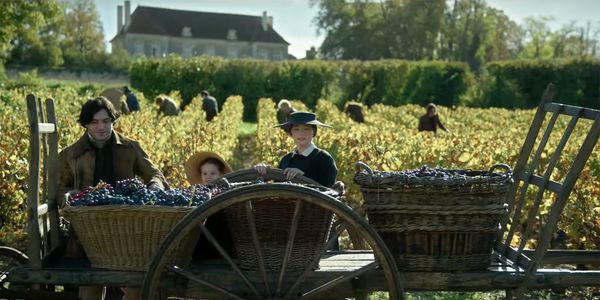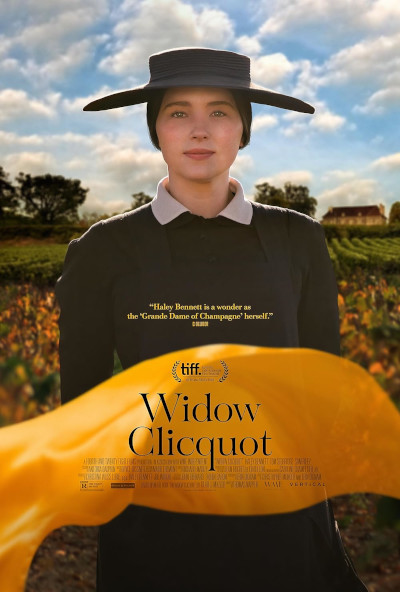Eye For Film >> Movies >> Widow Clicquot (2023) Film Review
Widow Clicquot
Reviewed by: Jennie Kermode

Between 1805 and 1866, Barbe-Nicole Ponsardin Clicquot – better known, from the label on her bottles, simply as Veuve Clicquot – had a transformative effect on French wine-making, in terms of artistry, engineering and management. She was the first woman ever to manage a major French company and her success changed attitudes to women in business, with both it and her considerable fortune going on to fuel the feminist movement a century later. This film is based not directly on her life but on the somewhat romanticised version of it penned by author Tilar J Mazzeo, The Widow Clicquot: The Story Of A Champagne Empire And The Woman Who Ruled It. The familiar trappings of the period piece are all present, yet it is still Barbe-Nicole’s tremendous presence which dominates the story – as one might expect with Haley Bennett in the lead.
The film is a romance, of sorts, but a tragic one. We see Barbe-Nicole with her beloved François (Tom Sturridge) in the opening scenes, where he asks her to be his Émilie – referring to Mme du Châtelet, the philosopher and scientist adored by Voltaire. It’s a very specific choice of comparison, which emphasises the particularity of their love. Whilst he will go on to describe her as perfect, it is her shrewdness and her strength that he values most. These early scenes, however, are intercut with scenes of her being dressed in funeral garb, bearing lilies as she leads a funerary procession. She is only 27, and alone again.

What happened to François? This story unfolds in flashback, in parallel with the central tale, which focuses on Barbe-Nicole’s struggle to retain control of the vineyards that he willed to her. Even at the funeral, her neighbour, Mr Moët, is sizing up the land. “I cannot allow you to go to your ruin,” protests her father-in-law Phillipe (Ben Miles). Her position is that she knows the specific agricultural issues involved better than anyone else, as she and François worked together to cultivate distinctive hybrid grapes and blend the resulting juices. With a staff who largely seem to recognise this, and remain loyal, she must overcome the business’ existing financial difficulties and find a way forward, despite everything from social attitudes to geopolitical conflicts seeming to be set against her.
To make the story work, director Thomas Napper must pay similar attention to blending, ensuring that it does not become too sweet or too dry. He avoids the former by having his characters approach romance with a passion which also allows for practicality. Barbe-Nicole is accepting of François’ feelings for distributor Louis (Sam Riley, who co-starred with her in She Is Love), who stands by her after he has gone. She stands by her husband as he undergoes a process of mental dissolution whose precise cause is never spelled out (though several possibilities will present themselves to those familiar with the period), but for all that Napper dwells on his actors’ beauty, he does not shy away from showing us the ugly side of living with an emotionally unstable individual, and Bennett shows us the heartbreak of having to send her daughter Clementine away for her own protection.
Not too sweet, then; but neither too dry, as Louis’ continued presence ensures a vein of earthy humour – and then there is the characters’ relationship to the earth itself. Barbe-Nicole and François’ love is framed very much in relation to the land, as is the former’s grief, with shots which focus not just on the clichés of an idyllic landscape but on the vines and the soil they cling to. He also illuminates the film through his use of fabric, with bedcovers and hanging laundry, alongside Camille Ioos’ exquisite costumes, all chosen for the way they interact with light. The resulting focus on texture adds a palpable element alongside the visual and auditory; we are deprived only of the aroma and taste of the wine itself.
Despite its many grand visual flourishes, this is a film which succeeds because of its attention to detail, especially in the performances. Bennett’s combination of sensitivity and raw power is well deployed, and the minor roles are all well cast, with Anson Boon a standout as the befuddled young accountant who quickly finds himself taking orders from Barbe-Nicole instead of his boss. Sturridge gets the least room to manoeuvre as he navigates a part we’ve seen many times before (right down to his shirt and haircut), but he succeeds in capturing the necessary chemistry with Bennett, and the familiar stuff here provides a background against which she can emphasise what is extraordinary about Barbe-Nicole, right through to an ending which will oblige some viewers to rethink what the film is about.
With plenty of emotion and visual allure to satisfy the traditionalists, this is a film whose intelligence and willingness to engage (albeit in subtle ways) with the sociological shifts of the era gives it wider appeal. It’s yet another triumph for Bennett and fans of the book will be well pleased by it.
Reviewed on: 18 Jul 2024

















